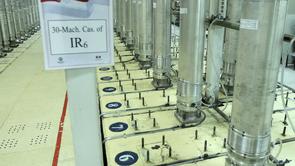 This photo released Nov 5, 2019, by the Atomic Energy Organization of Iran, shows centrifuge machines in the Natanz uranium enrichment facility in central Iran. (ATOMIC ENERGY ORGANIZATION OF IRAN / AP)
This photo released Nov 5, 2019, by the Atomic Energy Organization of Iran, shows centrifuge machines in the Natanz uranium enrichment facility in central Iran. (ATOMIC ENERGY ORGANIZATION OF IRAN / AP)
DUBAI - Iran will not stop its 20 percent uranium enrichment before the United States lifts all sanctions, Iranian state TV quoted an unnamed official as saying on Tuesday in reaction to a US media report that Washington would offer a new proposal to jump-start talks.
The Biden administration has been seeking to engage Iran in talks about both sides resuming compliance with the deal, under which economic sanctions on Tehran were removed in return for curbs on Iran’s nuclear program to make it harder to develop a nuclear weapon - an ambition Tehran denies.
A senior Iranian official tells Press TV that Tehran will stop its 20-percent uranium enrichment only if the US lifts ALL its sanctions on Iran first.
State-run Press TV, Iran
ALSO READ: Iran says sanctions could force shutdown of nuclear power plant
“A senior Iranian official tells Press TV that Tehran will stop its 20-percent uranium enrichment only if the US lifts ALL its sanctions on Iran first,” state-run Press TV said on its website.
“The official said Tehran will further reduce its commitments under the 2015 nuclear deal if the US does not lift all sanctions, warning that Washington is rapidly running out of time,” it added.
Separately, Iran’s United Nations mission tweeted: “No proposal is needed for the U.S. to rejoin the JCPOA (nuclear agreement). It only requires a political decision by the U.S. to fully and immediately implement all of its obligations under the accord...”
Politico reported that a US proposal, the details of which it said are still being worked out, would ask Iran to halt some of its nuclear activities, such as work on advanced centrifuges and the enrichment of uranium to 20 percent purity, in exchange for some relief from US economic sanctions.
READ MORE: US calls Iran's 20% uranium enrichment 'nuclear extortion'
US President Joe Biden’s predecessor, Donald Trump, withdrew from the deal in 2018 and reimposed US sanctions.
Iran, after waiting more than a year, retaliated by violating some of the pact’s nuclear restrictions, including a 3.67 percent limit on the purity to which it can enrich uranium.
The odds any progress to revive the deal before Iran holds a presidential election in June have dwindled after Tehran opted to take a tougher stance before returning to talks, officials have said.


